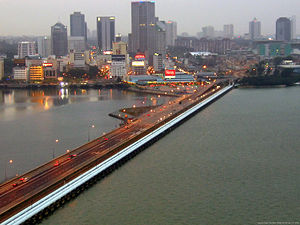I want your BRAIN

Brain Gain, Brain Drain. Brain Exchange. Brain Create. Brain Rot. Brain Happy.
Just saw the recent announcement of Malaysia’s effort to Brain Gain yesterday by allowing high skilled expats to get a 10 year residency pass with less restrictions (including not being employed) starting next April, and also allowing JPA scholars to serve their bond outside the civil service, while international media and netizens continues their debate on the Brain Drain where 700,000 Malaysians who work overseas, of which up to 400,000 of those working in this tiny island of Singapore. Some 386,000 of them became Permanent Residents over the years, and today, still 150,000 cross the border to work on a daily basis (pic: e.g. via causeway).
Shannon wrote a pretty wholesome article contrasting M’sia, S’pore and UK’s I-want-your-brain campaigns. The take-away for me is that if we continue to focus on brain gain and drain solely for the purpose of the economy, we will be stuck in the mentioned catch-22 situation (buying talent requires higher wages but to get to such a wage structure we need talent to help upgrade our economy). Best case: we will start to move in another direction – happiness is one – as a KPI in the war for talents – won’t it be nice to hire foreign talents that will maximize the happiness of your country?
On the other hand, keeping to the nationalistic theme also doesn’t cut it – it simply politicizes the idea of a citizen, restricts human freedom to move around (a fundamental human right at least according to article 13 of the United Nations Declaration of Human Rights), and make people pretty nasty. Whereas in Singapore, with the constant siege mentality (exacerbated by half the nation in arms), the debate becomes an identity issues, with both camps, for and against NS, both pointing at protecting foreigners as a thorny dilemma.
How about other ways to win the I-want-your-BRAIN war? Here are some reflections from brain-nation Singapore that I have spent the last 5+ years working in.
One idea that I call Brain Exchange has already seen some fruits in small ways. One case closer to my life is that of the NOC (NUS Overseas College) programme for NUS students to be made Stanford grads and catch the entrepreneur bug with a silicon valley startup. By giving brain (in the form of letting young people work in foreign organizations / countries) one can receive brain (when they graduate from their “programme”, they are either likely (or can be contracted) to hang around and replicate what they learned overseas). Industries varies – Infocomm is known for its relatively lower barrier of entry. Other examples I’m aware of are scholarships (like Rhodes, ASEAN, all have a component of returning to where you come from after learning) and internal company postings (e.g. most MNCs like to have their international staff work in their HQ for a period of time).
Then there’s a age old Brain Create a.k.a. education. Education in a larger sense is not just the knowledge garnering and upgrading of skills, but also the affinity that one gets when studying in a particular country. I continue to meet random people from around the world in both Malaysia and Singapore saying that they return to work / start-up etc. because of their fond memories of studying in this foreign land (also explains my constant urge to go back to the states). As your “create” brains through hubbing tertiary institutions or making high valued work accessible to all that’s capable, more brains are likely to stick around to gather moss.
There is also the Brain Rot issue. First from the skill sets perspective, a lot of brain rots within their job roles that forces them to stay in line. Perhaps more so in governments and large organizations than smaller agile ones. Talent subdued is brain never gained – especially when economic maximizers dictates that we do not need another cog in the system that adds no value. Besides there’s always the humanistic / psychological need of a human being as well – whether one is always under mental stress to perform, to contribute, to become the most well oiled component in the economy. We can stop the brain rot by helping people’s lives to be more wholesome, as well as provide sufficient opportunities to challenge the person to utilize their skills and talents.
Finally, using the “American Dream” as an anology, let’s put ourselves in the shoes of the people who leave their homeland to seek good fortunes and good life. The previous century’s debate has been centered more on the pursuit of liberty than the pursuit of happiness. But once sufficient liberty is attained, which is the case in most major cities fighting for “talent”, pursuit of happiness can perhaps be reemphasized. I’m sure some will argue that we still don’t have enough liberty in Malaysia, Singapore or your country of choice, even as the meaning of liberty is slowly changing in the face of the globalised issues we face today (e.g. what is a meaningful social contract with all the governments in a world that’s full of environmental or security issues?) but the bigger crisis in cities is the price that comes with a markedly improved economies: the unhappy Brain that transcend locality and culture.
Let’s change our discourse to focus more on how we can live happily together, regardless of background (nationality, ethic, what not). Without necessarily copying Bhutan wholesale, any form of measurement of happiness in addition to current measurement of success (such as birth rate, migration, net brain gain, or GDP) should be incorporated not just as a policy, but also in our own pursuit to create the best place to live our our dreams.
Brain Happy.
